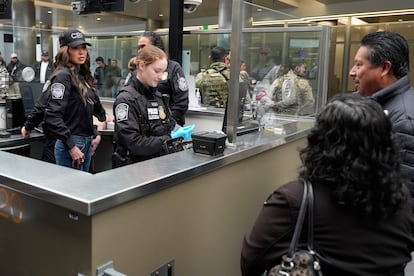Trump’s Homeland Security chief visits El Salvador, Colombia and Mexico to push tough immigration stance
Kristi Noem will visit El Salvador’s mega-prison this Wednesday, which houses the more than 200 Venezuelans who were deported mid-March

The start of the first international trip of the new U.S. Secretary of Homeland Security, Kristi Noem, could not be more symbolic. This Wednesday, she will visit the Terrorism Confinement Center (CECOT), alongside El Salvador’s Justice Minister Gustavo Villatoro. The mega-prison where President Nayib Bukele has imprisoned tens of thousands of alleged gang members has become a symbol of the Trump administration’s hardline stance on undocumented migration and the lengths to which it is willing to go to combat it.
More than 200 Venezuelans arrived at the prison on March 16. Deported from the United States without due process, they were expelled under an 18th-century law that allowed for swift removals — an action widely condemned by human rights organizations. A judge in the District of Columbia has since temporarily suspended the measure.
Initially, Trump linked the deportees to the Tren de Aragua, a criminal gang founded in Venezuelan prisons that has expanded across the region. However, his administration later admitted that over 100 of those expelled had not committed any crime. In other words, they are only accused of entering the United States without documentation — a civil, not criminal, offense under U.S. law.
Noem’s visit to El Salvador — where she will also meet with President Bukele, who has become the U.S. administration’s closest ally in the region — is the first stop on a three-day tour that will take the U.S. national security chief to Colombia and Mexico.

Next stops: Colombia and Mexico
While Mexican President Claudia Sheinbaum has found common ground to address Trump’s threats to impose tariffs on Mexican products, Colombian President Gustavo Petro clashed with the U.S. administration after refusing to accept a military plane full of deportees, an incident that Colombian diplomats ultimately resolved.
Noem is scheduled to arrive in Bogotá on Thursday. She will meet with several senior officials, including Petro, Foreign Minister Laura Sarabia, the defense minister, the police chief, and the director of the border control agency Colombian Migration. This is a select group of officials, responsible not only with the South American country’s international relations, but also for managing migration and the fight against drug trafficking. Not surprisingly, both are top priorities for the Trump administration.
Colombia is by far the world’s leading producer and exporter of cocaine. What’s more, with nearly three million immigrants from neighboring Venezuela, it is the largest host state for people fleeing the Nicolás Maduro regime. Many of these migrants have continued their journey northward to the United States.
Relations between the two governments went through a brief but very difficult moment exactly two months ago, on January 26, when the Colombian president rejected U.S. military flights carrying Colombians deported by Trump.
In response, Trump threatened to impose tariffs on Colombian exports, and Petro warned that he would retaliate with equivalent measures if necessary. However, within 24 hours — before the threats could materialize — high-ranking officials from both countries, including Foreign Minister Laura Sarabia, brokered an agreement to ease tensions.
Since then, deported Colombians have been flown home without chains or shackles, a practice Petro described as inhumane treatment. Instead, they return on flights paid for by Colombia. Tensions between the U.S. and Colombia have since eased, despite the fact that the South American country is the most affected in the region by Trump’s cuts to the USAID cooperation agency.
On Friday, Noem will arrive in Mexico City, becoming the first high-ranking representative of the Trump administration to set foot on Mexican soil during the Republican’s second term. Her trip comes at a crucial time, with both nations engaged in negotiations amid the looming threat of U.S. tariffs — the latest pause on their implementation set to expire on April 2. However, Noem’s agenda will not focus on trade, as confirmed by the Mexican president. “It has nothing to do with the issue of tariffs; it’s about following up on the agreements we reached on security matters,” Sheinbaum said on Tuesday at her morning press conference.
In this tug-of-war over tariffs, the Mexican government has pledged to deliver results on security, from the arrest and surrender of criminals wanted by the U.S. to an increase in fentanyl seizures. Meanwhile, migration will also be a key topic in Noem’s meeting with Sheinbaum and her Cabinet: Foreign Minister Juan Ramón de la Fuente, Secretary of the Interior Rosa Icela Rodríguez, and Security Czar Omar García Harfuch.
Mexicans are the largest foreign-born population in the United States. Additionally, as Washington enforces increasingly strict immigration policies, Mexico has shifted from being merely a transit country to a migration destination. Both Sheinbaum and her predecessor, Andrés Manuel López Obrador, have had to concede to the Trump administration’s demands to increase border controls and reduce the flow of migrants heading north.
Sign up for our weekly newsletter to get more English-language news coverage from EL PAÍS USA Edition
Tu suscripción se está usando en otro dispositivo
¿Quieres añadir otro usuario a tu suscripción?
Si continúas leyendo en este dispositivo, no se podrá leer en el otro.
FlechaTu suscripción se está usando en otro dispositivo y solo puedes acceder a EL PAÍS desde un dispositivo a la vez.
Si quieres compartir tu cuenta, cambia tu suscripción a la modalidad Premium, así podrás añadir otro usuario. Cada uno accederá con su propia cuenta de email, lo que os permitirá personalizar vuestra experiencia en EL PAÍS.
¿Tienes una suscripción de empresa? Accede aquí para contratar más cuentas.
En el caso de no saber quién está usando tu cuenta, te recomendamos cambiar tu contraseña aquí.
Si decides continuar compartiendo tu cuenta, este mensaje se mostrará en tu dispositivo y en el de la otra persona que está usando tu cuenta de forma indefinida, afectando a tu experiencia de lectura. Puedes consultar aquí los términos y condiciones de la suscripción digital.









































